Book contents
- Frontmatter
- Contents
- List of figures and tables
- Acknowledgments
- List of abbreviations
- 1 A new Germany in Europe?
- 2 Unification and “Germany in Europe”
- 3 Continuity in trade and internal market
- 4 Mixed outcomes in energy and environment
- 5 Change in competition policy
- 6 Change in structural funds and the CAP
- 7 A new Germany in Europe
- Bibliography
- Index
4 - Mixed outcomes in energy and environment
Published online by Cambridge University Press: 22 September 2009
- Frontmatter
- Contents
- List of figures and tables
- Acknowledgments
- List of abbreviations
- 1 A new Germany in Europe?
- 2 Unification and “Germany in Europe”
- 3 Continuity in trade and internal market
- 4 Mixed outcomes in energy and environment
- 5 Change in competition policy
- 6 Change in structural funds and the CAP
- 7 A new Germany in Europe
- Bibliography
- Index
Summary
The domestic politics of environment and energy were extremely intense after unification, and resulted in discernible shifts in national policy objectives, unlike the two cases reviewed in the preceding chapter. Yet these regulative policy areas were characterized by strong elements of continuity in basic German objectives at the EU level. That said, subtle changes in Bonn's European policies did in fact materialize during this period; the government's approach to EC/EU environmental policy grew more cautious, while its internal energy market policies took on a more determined cast.
Environmental policy
The Treaty of Rome makes no mention of the environment, let alone a common EC environmental policy. Nevertheless, the topic surfaced repeatedly during the 1960s, specifically in the context of the internal market. The Commission quickly discovered the importance of coordinating and where necessary harmonizing the environmental regulations of the member governments, in order to ensure that national governments did not erect green barriers, such as the classification and packaging of dangerous substances or auto emission standards, to the free flow of goods and services in the common market. At the Paris summit in 1972, the EC heads of state, drawing on this Community regulatory experience in environmental matters as well as on Article 2 of the Treaty of Rome, which defined the tasks of the EC in terms of “a continued and balanced expansion” and “an accelerated raising of the standard of living,” expressly identified the protection of the environment as a Community objective, and established a new Directorate General in the Commission to handle these matters (DG-XI).
- Type
- Chapter
- Information
- German Unification and the Union of EuropeThe Domestic Politics of Integration Policy, pp. 83 - 112Publisher: Cambridge University PressPrint publication year: 1999



